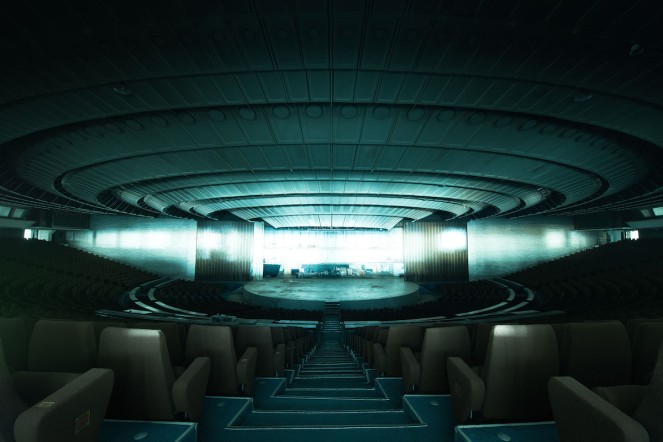Baikal heaves the door open and the sound echoes inside.
It echoes. This place is huge, like some awesome underground cavern hollowed out by hundreds of years of rainfall. The last time I heard an echo like this was while stripping scrap metal inside the wreck of an immense container ship out on the Laptev salt flats, and that was the biggest ship I’d ever vultured.
The light from the door pours down a set of blue carpeted stairs and hits the startling white of a large, raised platform in the shape of a semicircle. As my eyes adjust to the dimness, I see that the room – the enormous room – sweeps around in a larger version of the same semicircle. Channels of stairs descend to the raised platform from several dark doors along the curving far wall. And the place is filled with row after concentric row of folding seats, all facing in towards that white, raised stage. The ceiling matches the floor, sweeping in towards the stage in huge metallic ribs. It looks like the underbelly of a spaceship, and the little circle just above the stage itself looks like it could open up and reveal a tractor beam, ready to capture hapless specimens and beam them up for experiments. The scale of the space is staggering, like stepping into a dragon’s mouth. It takes a moment to rein in my surprise.
“Is big, huh?” Baikal gurns toothlessly, pushing a wad of matted hair back from her face. “I not even see the all place yet.” She gestures expansively. “Goes long, all underground. Could be a kovcheg, huh?”
I don’t rise to the bait. If she really thought this was a kovcheg site she wouldn’t be showing me. She’s trying to screw me out of another few loms for bringing me here. I don’t know anyone who’s found a kovcheg yet – not that I believe anyway. I don’t think they ever existed. Maybe there was a bunker or two dotted around, for rich oil barons and their mistresses. But the old men who talk about whole communities disappearing underground to safety before the bombs fell are deluding themselves.
Which is not to say that this place doesn’t have value though. The stage is worn and stained, but the rest of the place – the chairs, the walls, even the carpets – are in something close to pristine condition. I run my hand over the top of the nearest seat. This room has barely had dust settle in it.
Baikal watches my hand. “Is good. Is clean. No one come here but me. No one know.” Considering the debris above ground, and the combat zones we had to cross to get here, I could believe it. You’d never know this was here from above. And that means it’s probably unlooted.
“Come on,” I say. “Let’s see what there is to see.”
Behind the stage is a large, open space, with frayed ropes leading up to metal struts in the ceiling. I’ve seen a similar mechanism in some of the dom na dereve communities out in the dead forests, raising and lowering heavy weights. Twisted metal boxes with sprays of shattered glass dot the floor and our feet crunch as we make our way through.
Beyond the stage is a maze of passageways, but Baikal has a destination in mind, and leads me through on a route she already knows. She opens a door to a little side room. The smell of damp and dust is overwhelming. I hesitate, and Baikal leers at me once more.
“Go look,” she says. “You will like it.”
I cover my mouth and nose with my sleeve and step inside.
The roof here has been cracked and damaged by falling buildings overhead, and everything is covered in a thick layer of plaster dust. An old burst water pipe sagging from the ceiling drips idly onto the mildewed floor. Orange mushrooms fan up against the putrid carpet where the watermark ends.
But that’s not what catches my eye. All along the walls here are racks and racks of clothes. Old clothes, some of them in ancient styles. Dresses sewn with sequins, jackets with puffy sleeves, voluminous skirts completely impractical to wear. I run my hand along them in awe and I hear the smacking sound of Baikal grinning to herself. Damn. She got me. Kovcheg or not, she’ll squeeze another handful of loms out of me for this find.
And let her. Beyond the value of the fabric just in scrap, this is a priceless find. This is history and culture, in a land wiped clean and taken back to the dirt. This is a memory of who we used to be. Maybe of who we could be again, one day. Each garment here is a story. Each one is hope.
Of course, I don’t care much for that myself. But if I can find the right dreamers, and spin the right tale, these mouldy old costumes will keep me in food and uncontaminated water for months.
…
Here’s Day 3 of Writers HQ‘s #WritingAdvent, a little late. Our prompt was ‘Lost & Forgotten’. We were sent to find some inspiring Urbex pictures (and I highly recommend you go and Google ‘urbex’ right now. You’re welcome.) and devise a story from one that we liked. I went with this one from Fubiz:

In among all the pictures of peeling paint walls and rotten floorboards, these eerily perfect theatre seats really spoke to me. It also put me firmly in the world of Mutant Year Zero, a roleplaying game that I’m a part of at the moment. And so the story began…
But what do you get from it? What stories do you see here? What’s your favourite urbex location? Leave me a comment below – and if you’re doing #WritingAdvent, let me know so I can cheer you on on social media!








